Dementia Syndrome: Causes, Types, Diagnosis, and Fluctuations
VerifiedAdded on 2023/01/13
|14
|4853
|20
Report
AI Summary
This report provides an in-depth analysis of dementia, a syndrome characterized by memory loss, problem-solving difficulties, and cognitive decline. It explores the causes of dementia, including Alzheimer's, vascular dementia, and Pick's disease, highlighting the areas of the brain affected by each type. The report also discusses the types of memory impairment experienced by individuals with dementia, such as memory loss, behavioral changes, and judgment issues. Furthermore, it examines how individuals process information, considering the limitations and abilities of those with dementia. Factors contributing to changes in a patient's condition, such as stress, poor diet, and medication, are also addressed. The report further investigates the fluctuations in abilities and needs of individuals with dementia, emphasizing the importance of early diagnosis and person-centered care. It also describes the impact of early diagnosis and follow-up on the lives of patients and their families. This study provides a comprehensive overview of dementia, aimed at improving care and understanding of this complex condition.

Paraphrase This Document
Need a fresh take? Get an instant paraphrase of this document with our AI Paraphraser

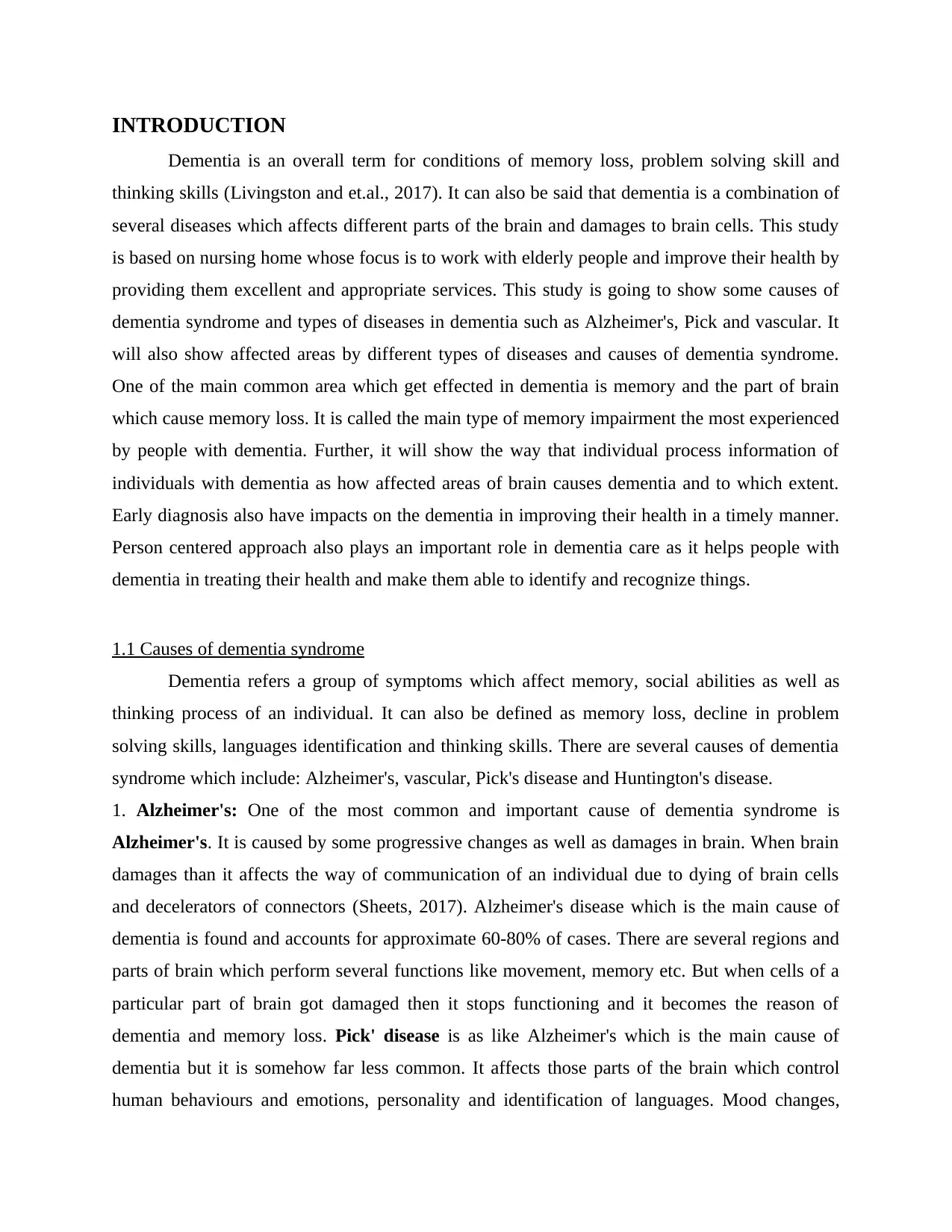
INTRODUCTION
Dementia is an overall term for conditions of memory loss, problem solving skill and
thinking skills (Livingston and et.al., 2017). It can also be said that dementia is a combination of
several diseases which affects different parts of the brain and damages to brain cells. This study
is based on nursing home whose focus is to work with elderly people and improve their health by
providing them excellent and appropriate services. This study is going to show some causes of
dementia syndrome and types of diseases in dementia such as Alzheimer's, Pick and vascular. It
will also show affected areas by different types of diseases and causes of dementia syndrome.
One of the main common area which get effected in dementia is memory and the part of brain
which cause memory loss. It is called the main type of memory impairment the most experienced
by people with dementia. Further, it will show the way that individual process information of
individuals with dementia as how affected areas of brain causes dementia and to which extent.
Early diagnosis also have impacts on the dementia in improving their health in a timely manner.
Person centered approach also plays an important role in dementia care as it helps people with
dementia in treating their health and make them able to identify and recognize things.
1.1 Causes of dementia syndrome
Dementia refers a group of symptoms which affect memory, social abilities as well as
thinking process of an individual. It can also be defined as memory loss, decline in problem
solving skills, languages identification and thinking skills. There are several causes of dementia
syndrome which include: Alzheimer's, vascular, Pick's disease and Huntington's disease.
1. Alzheimer's: One of the most common and important cause of dementia syndrome is
Alzheimer's. It is caused by some progressive changes as well as damages in brain. When brain
damages than it affects the way of communication of an individual due to dying of brain cells
and decelerators of connectors (Sheets, 2017). Alzheimer's disease which is the main cause of
dementia is found and accounts for approximate 60-80% of cases. There are several regions and
parts of brain which perform several functions like movement, memory etc. But when cells of a
particular part of brain got damaged then it stops functioning and it becomes the reason of
dementia and memory loss. Pick' disease is as like Alzheimer's which is the main cause of
dementia but it is somehow far less common. It affects those parts of the brain which control
human behaviours and emotions, personality and identification of languages. Mood changes,
Dementia is an overall term for conditions of memory loss, problem solving skill and
thinking skills (Livingston and et.al., 2017). It can also be said that dementia is a combination of
several diseases which affects different parts of the brain and damages to brain cells. This study
is based on nursing home whose focus is to work with elderly people and improve their health by
providing them excellent and appropriate services. This study is going to show some causes of
dementia syndrome and types of diseases in dementia such as Alzheimer's, Pick and vascular. It
will also show affected areas by different types of diseases and causes of dementia syndrome.
One of the main common area which get effected in dementia is memory and the part of brain
which cause memory loss. It is called the main type of memory impairment the most experienced
by people with dementia. Further, it will show the way that individual process information of
individuals with dementia as how affected areas of brain causes dementia and to which extent.
Early diagnosis also have impacts on the dementia in improving their health in a timely manner.
Person centered approach also plays an important role in dementia care as it helps people with
dementia in treating their health and make them able to identify and recognize things.
1.1 Causes of dementia syndrome
Dementia refers a group of symptoms which affect memory, social abilities as well as
thinking process of an individual. It can also be defined as memory loss, decline in problem
solving skills, languages identification and thinking skills. There are several causes of dementia
syndrome which include: Alzheimer's, vascular, Pick's disease and Huntington's disease.
1. Alzheimer's: One of the most common and important cause of dementia syndrome is
Alzheimer's. It is caused by some progressive changes as well as damages in brain. When brain
damages than it affects the way of communication of an individual due to dying of brain cells
and decelerators of connectors (Sheets, 2017). Alzheimer's disease which is the main cause of
dementia is found and accounts for approximate 60-80% of cases. There are several regions and
parts of brain which perform several functions like movement, memory etc. But when cells of a
particular part of brain got damaged then it stops functioning and it becomes the reason of
dementia and memory loss. Pick' disease is as like Alzheimer's which is the main cause of
dementia but it is somehow far less common. It affects those parts of the brain which control
human behaviours and emotions, personality and identification of languages. Mood changes,
⊘ This is a preview!⊘
Do you want full access?
Subscribe today to unlock all pages.

Trusted by 1+ million students worldwide
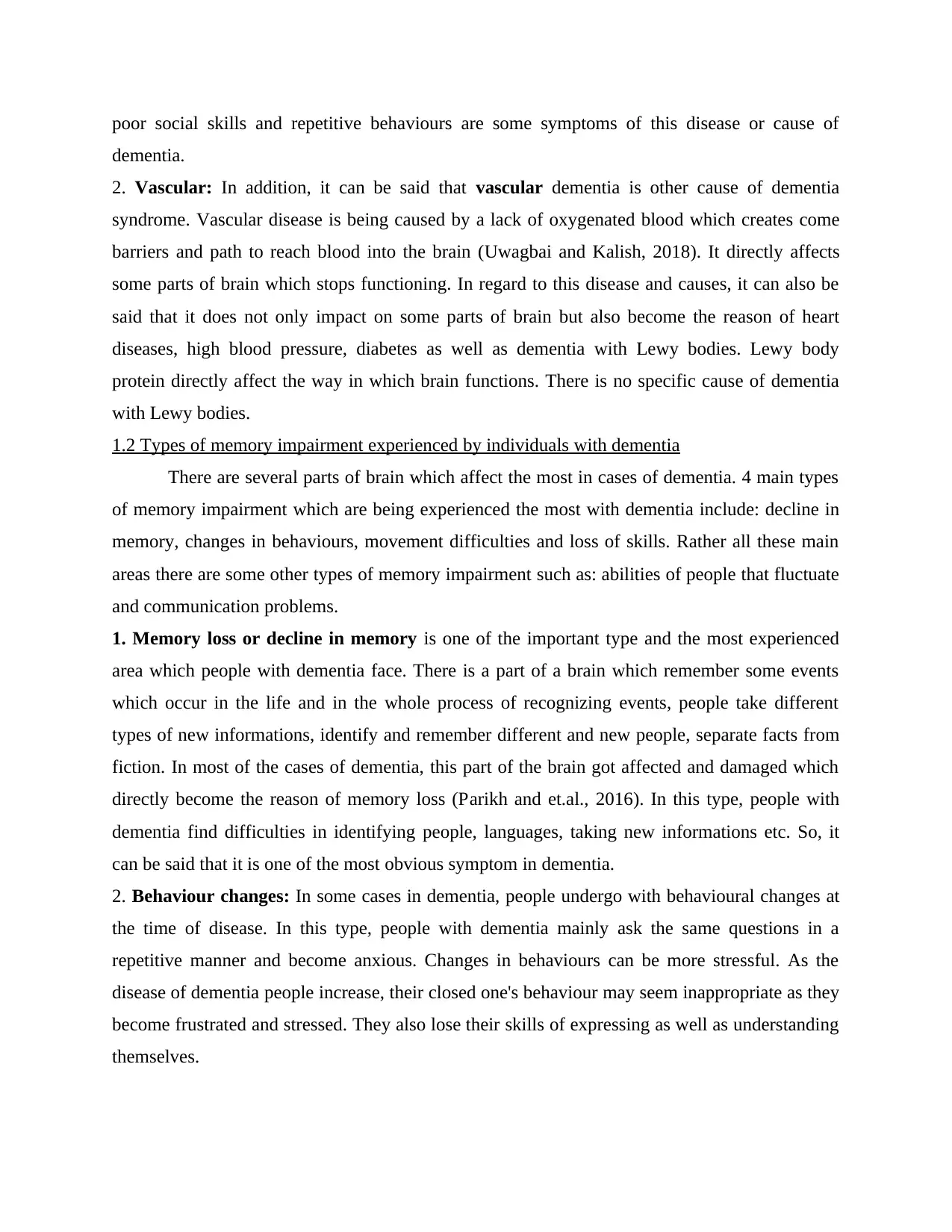
poor social skills and repetitive behaviours are some symptoms of this disease or cause of
dementia.
2. Vascular: In addition, it can be said that vascular dementia is other cause of dementia
syndrome. Vascular disease is being caused by a lack of oxygenated blood which creates come
barriers and path to reach blood into the brain (Uwagbai and Kalish, 2018). It directly affects
some parts of brain which stops functioning. In regard to this disease and causes, it can also be
said that it does not only impact on some parts of brain but also become the reason of heart
diseases, high blood pressure, diabetes as well as dementia with Lewy bodies. Lewy body
protein directly affect the way in which brain functions. There is no specific cause of dementia
with Lewy bodies.
1.2 Types of memory impairment experienced by individuals with dementia
There are several parts of brain which affect the most in cases of dementia. 4 main types
of memory impairment which are being experienced the most with dementia include: decline in
memory, changes in behaviours, movement difficulties and loss of skills. Rather all these main
areas there are some other types of memory impairment such as: abilities of people that fluctuate
and communication problems.
1. Memory loss or decline in memory is one of the important type and the most experienced
area which people with dementia face. There is a part of a brain which remember some events
which occur in the life and in the whole process of recognizing events, people take different
types of new informations, identify and remember different and new people, separate facts from
fiction. In most of the cases of dementia, this part of the brain got affected and damaged which
directly become the reason of memory loss (Parikh and et.al., 2016). In this type, people with
dementia find difficulties in identifying people, languages, taking new informations etc. So, it
can be said that it is one of the most obvious symptom in dementia.
2. Behaviour changes: In some cases in dementia, people undergo with behavioural changes at
the time of disease. In this type, people with dementia mainly ask the same questions in a
repetitive manner and become anxious. Changes in behaviours can be more stressful. As the
disease of dementia people increase, their closed one's behaviour may seem inappropriate as they
become frustrated and stressed. They also lose their skills of expressing as well as understanding
themselves.
dementia.
2. Vascular: In addition, it can be said that vascular dementia is other cause of dementia
syndrome. Vascular disease is being caused by a lack of oxygenated blood which creates come
barriers and path to reach blood into the brain (Uwagbai and Kalish, 2018). It directly affects
some parts of brain which stops functioning. In regard to this disease and causes, it can also be
said that it does not only impact on some parts of brain but also become the reason of heart
diseases, high blood pressure, diabetes as well as dementia with Lewy bodies. Lewy body
protein directly affect the way in which brain functions. There is no specific cause of dementia
with Lewy bodies.
1.2 Types of memory impairment experienced by individuals with dementia
There are several parts of brain which affect the most in cases of dementia. 4 main types
of memory impairment which are being experienced the most with dementia include: decline in
memory, changes in behaviours, movement difficulties and loss of skills. Rather all these main
areas there are some other types of memory impairment such as: abilities of people that fluctuate
and communication problems.
1. Memory loss or decline in memory is one of the important type and the most experienced
area which people with dementia face. There is a part of a brain which remember some events
which occur in the life and in the whole process of recognizing events, people take different
types of new informations, identify and remember different and new people, separate facts from
fiction. In most of the cases of dementia, this part of the brain got affected and damaged which
directly become the reason of memory loss (Parikh and et.al., 2016). In this type, people with
dementia find difficulties in identifying people, languages, taking new informations etc. So, it
can be said that it is one of the most obvious symptom in dementia.
2. Behaviour changes: In some cases in dementia, people undergo with behavioural changes at
the time of disease. In this type, people with dementia mainly ask the same questions in a
repetitive manner and become anxious. Changes in behaviours can be more stressful. As the
disease of dementia people increase, their closed one's behaviour may seem inappropriate as they
become frustrated and stressed. They also lose their skills of expressing as well as understanding
themselves.
Paraphrase This Document
Need a fresh take? Get an instant paraphrase of this document with our AI Paraphraser
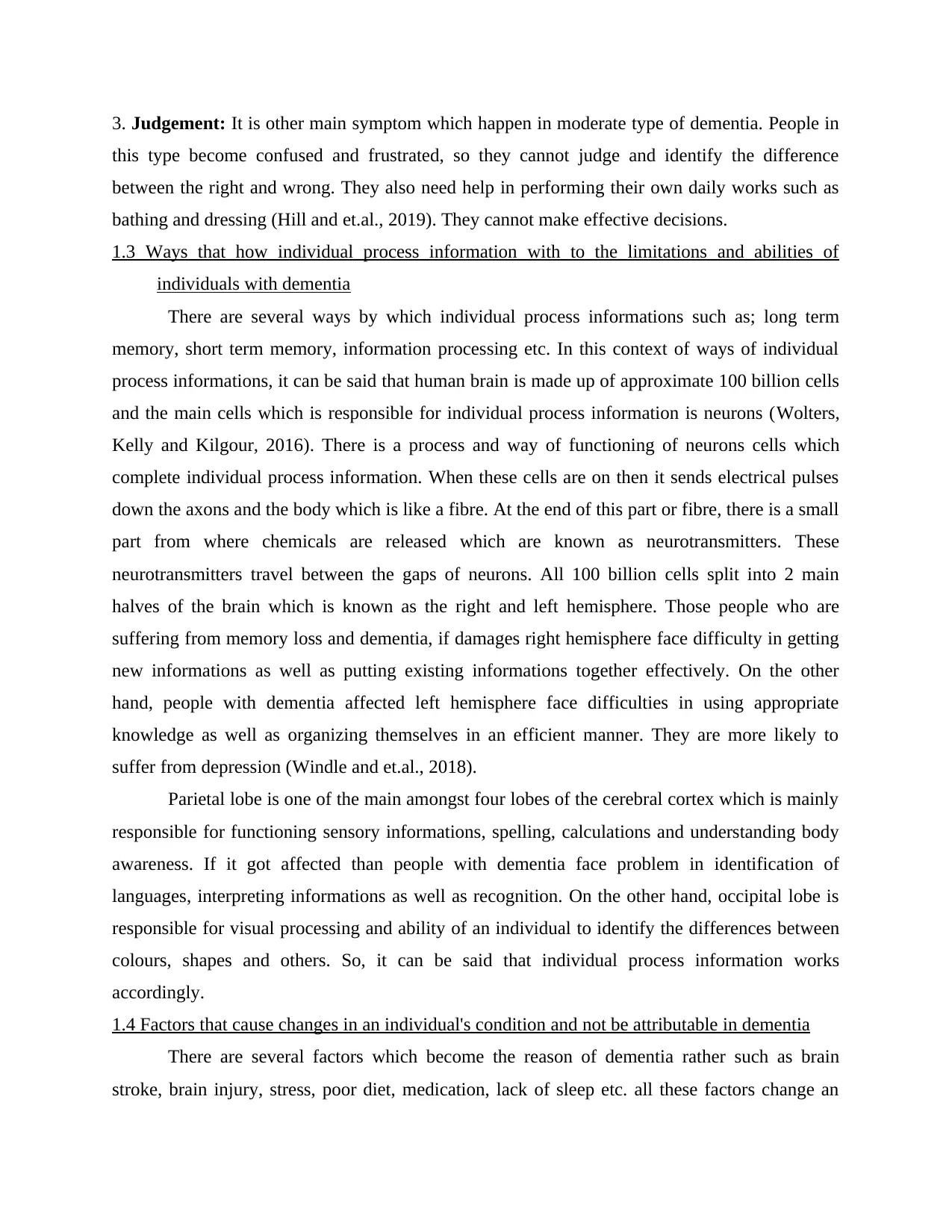
3. Judgement: It is other main symptom which happen in moderate type of dementia. People in
this type become confused and frustrated, so they cannot judge and identify the difference
between the right and wrong. They also need help in performing their own daily works such as
bathing and dressing (Hill and et.al., 2019). They cannot make effective decisions.
1.3 Ways that how individual process information with to the limitations and abilities of
individuals with dementia
There are several ways by which individual process informations such as; long term
memory, short term memory, information processing etc. In this context of ways of individual
process informations, it can be said that human brain is made up of approximate 100 billion cells
and the main cells which is responsible for individual process information is neurons (Wolters,
Kelly and Kilgour, 2016). There is a process and way of functioning of neurons cells which
complete individual process information. When these cells are on then it sends electrical pulses
down the axons and the body which is like a fibre. At the end of this part or fibre, there is a small
part from where chemicals are released which are known as neurotransmitters. These
neurotransmitters travel between the gaps of neurons. All 100 billion cells split into 2 main
halves of the brain which is known as the right and left hemisphere. Those people who are
suffering from memory loss and dementia, if damages right hemisphere face difficulty in getting
new informations as well as putting existing informations together effectively. On the other
hand, people with dementia affected left hemisphere face difficulties in using appropriate
knowledge as well as organizing themselves in an efficient manner. They are more likely to
suffer from depression (Windle and et.al., 2018).
Parietal lobe is one of the main amongst four lobes of the cerebral cortex which is mainly
responsible for functioning sensory informations, spelling, calculations and understanding body
awareness. If it got affected than people with dementia face problem in identification of
languages, interpreting informations as well as recognition. On the other hand, occipital lobe is
responsible for visual processing and ability of an individual to identify the differences between
colours, shapes and others. So, it can be said that individual process information works
accordingly.
1.4 Factors that cause changes in an individual's condition and not be attributable in dementia
There are several factors which become the reason of dementia rather such as brain
stroke, brain injury, stress, poor diet, medication, lack of sleep etc. all these factors change an
this type become confused and frustrated, so they cannot judge and identify the difference
between the right and wrong. They also need help in performing their own daily works such as
bathing and dressing (Hill and et.al., 2019). They cannot make effective decisions.
1.3 Ways that how individual process information with to the limitations and abilities of
individuals with dementia
There are several ways by which individual process informations such as; long term
memory, short term memory, information processing etc. In this context of ways of individual
process informations, it can be said that human brain is made up of approximate 100 billion cells
and the main cells which is responsible for individual process information is neurons (Wolters,
Kelly and Kilgour, 2016). There is a process and way of functioning of neurons cells which
complete individual process information. When these cells are on then it sends electrical pulses
down the axons and the body which is like a fibre. At the end of this part or fibre, there is a small
part from where chemicals are released which are known as neurotransmitters. These
neurotransmitters travel between the gaps of neurons. All 100 billion cells split into 2 main
halves of the brain which is known as the right and left hemisphere. Those people who are
suffering from memory loss and dementia, if damages right hemisphere face difficulty in getting
new informations as well as putting existing informations together effectively. On the other
hand, people with dementia affected left hemisphere face difficulties in using appropriate
knowledge as well as organizing themselves in an efficient manner. They are more likely to
suffer from depression (Windle and et.al., 2018).
Parietal lobe is one of the main amongst four lobes of the cerebral cortex which is mainly
responsible for functioning sensory informations, spelling, calculations and understanding body
awareness. If it got affected than people with dementia face problem in identification of
languages, interpreting informations as well as recognition. On the other hand, occipital lobe is
responsible for visual processing and ability of an individual to identify the differences between
colours, shapes and others. So, it can be said that individual process information works
accordingly.
1.4 Factors that cause changes in an individual's condition and not be attributable in dementia
There are several factors which become the reason of dementia rather such as brain
stroke, brain injury, stress, poor diet, medication, lack of sleep etc. all these factors change an
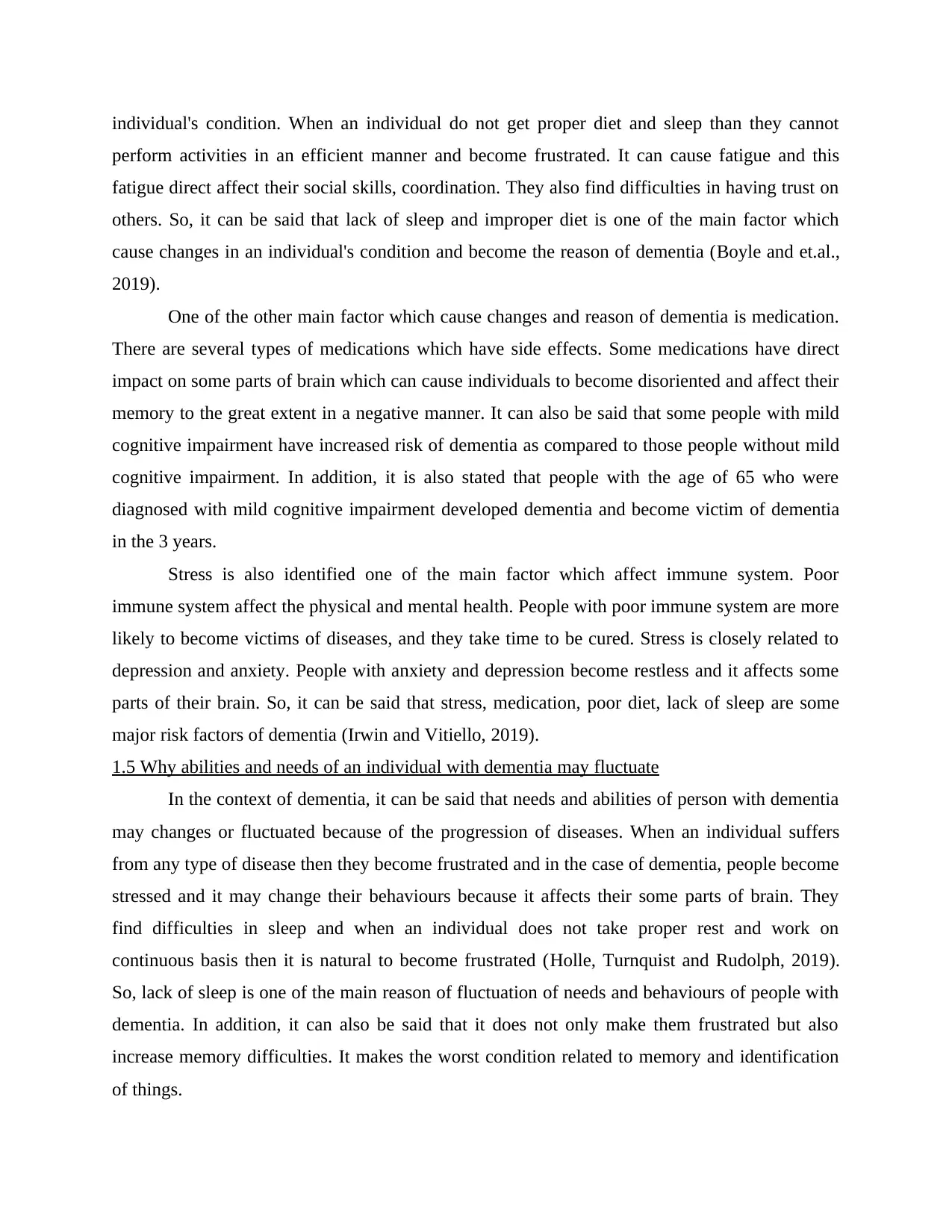
individual's condition. When an individual do not get proper diet and sleep than they cannot
perform activities in an efficient manner and become frustrated. It can cause fatigue and this
fatigue direct affect their social skills, coordination. They also find difficulties in having trust on
others. So, it can be said that lack of sleep and improper diet is one of the main factor which
cause changes in an individual's condition and become the reason of dementia (Boyle and et.al.,
2019).
One of the other main factor which cause changes and reason of dementia is medication.
There are several types of medications which have side effects. Some medications have direct
impact on some parts of brain which can cause individuals to become disoriented and affect their
memory to the great extent in a negative manner. It can also be said that some people with mild
cognitive impairment have increased risk of dementia as compared to those people without mild
cognitive impairment. In addition, it is also stated that people with the age of 65 who were
diagnosed with mild cognitive impairment developed dementia and become victim of dementia
in the 3 years.
Stress is also identified one of the main factor which affect immune system. Poor
immune system affect the physical and mental health. People with poor immune system are more
likely to become victims of diseases, and they take time to be cured. Stress is closely related to
depression and anxiety. People with anxiety and depression become restless and it affects some
parts of their brain. So, it can be said that stress, medication, poor diet, lack of sleep are some
major risk factors of dementia (Irwin and Vitiello, 2019).
1.5 Why abilities and needs of an individual with dementia may fluctuate
In the context of dementia, it can be said that needs and abilities of person with dementia
may changes or fluctuated because of the progression of diseases. When an individual suffers
from any type of disease then they become frustrated and in the case of dementia, people become
stressed and it may change their behaviours because it affects their some parts of brain. They
find difficulties in sleep and when an individual does not take proper rest and work on
continuous basis then it is natural to become frustrated (Holle, Turnquist and Rudolph, 2019).
So, lack of sleep is one of the main reason of fluctuation of needs and behaviours of people with
dementia. In addition, it can also be said that it does not only make them frustrated but also
increase memory difficulties. It makes the worst condition related to memory and identification
of things.
perform activities in an efficient manner and become frustrated. It can cause fatigue and this
fatigue direct affect their social skills, coordination. They also find difficulties in having trust on
others. So, it can be said that lack of sleep and improper diet is one of the main factor which
cause changes in an individual's condition and become the reason of dementia (Boyle and et.al.,
2019).
One of the other main factor which cause changes and reason of dementia is medication.
There are several types of medications which have side effects. Some medications have direct
impact on some parts of brain which can cause individuals to become disoriented and affect their
memory to the great extent in a negative manner. It can also be said that some people with mild
cognitive impairment have increased risk of dementia as compared to those people without mild
cognitive impairment. In addition, it is also stated that people with the age of 65 who were
diagnosed with mild cognitive impairment developed dementia and become victim of dementia
in the 3 years.
Stress is also identified one of the main factor which affect immune system. Poor
immune system affect the physical and mental health. People with poor immune system are more
likely to become victims of diseases, and they take time to be cured. Stress is closely related to
depression and anxiety. People with anxiety and depression become restless and it affects some
parts of their brain. So, it can be said that stress, medication, poor diet, lack of sleep are some
major risk factors of dementia (Irwin and Vitiello, 2019).
1.5 Why abilities and needs of an individual with dementia may fluctuate
In the context of dementia, it can be said that needs and abilities of person with dementia
may changes or fluctuated because of the progression of diseases. When an individual suffers
from any type of disease then they become frustrated and in the case of dementia, people become
stressed and it may change their behaviours because it affects their some parts of brain. They
find difficulties in sleep and when an individual does not take proper rest and work on
continuous basis then it is natural to become frustrated (Holle, Turnquist and Rudolph, 2019).
So, lack of sleep is one of the main reason of fluctuation of needs and behaviours of people with
dementia. In addition, it can also be said that it does not only make them frustrated but also
increase memory difficulties. It makes the worst condition related to memory and identification
of things.
⊘ This is a preview!⊘
Do you want full access?
Subscribe today to unlock all pages.

Trusted by 1+ million students worldwide
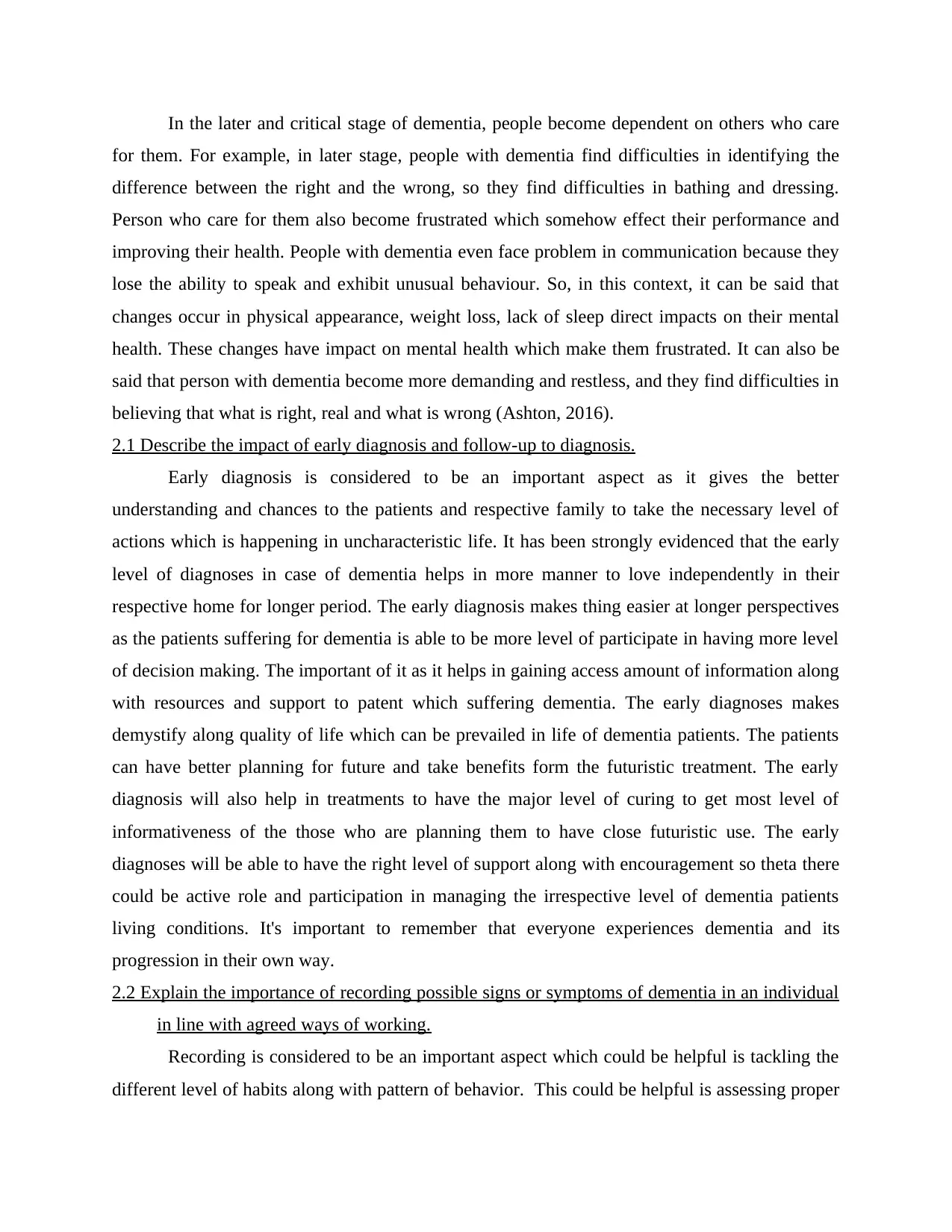
In the later and critical stage of dementia, people become dependent on others who care
for them. For example, in later stage, people with dementia find difficulties in identifying the
difference between the right and the wrong, so they find difficulties in bathing and dressing.
Person who care for them also become frustrated which somehow effect their performance and
improving their health. People with dementia even face problem in communication because they
lose the ability to speak and exhibit unusual behaviour. So, in this context, it can be said that
changes occur in physical appearance, weight loss, lack of sleep direct impacts on their mental
health. These changes have impact on mental health which make them frustrated. It can also be
said that person with dementia become more demanding and restless, and they find difficulties in
believing that what is right, real and what is wrong (Ashton, 2016).
2.1 Describe the impact of early diagnosis and follow-up to diagnosis.
Early diagnosis is considered to be an important aspect as it gives the better
understanding and chances to the patients and respective family to take the necessary level of
actions which is happening in uncharacteristic life. It has been strongly evidenced that the early
level of diagnoses in case of dementia helps in more manner to love independently in their
respective home for longer period. The early diagnosis makes thing easier at longer perspectives
as the patients suffering for dementia is able to be more level of participate in having more level
of decision making. The important of it as it helps in gaining access amount of information along
with resources and support to patent which suffering dementia. The early diagnoses makes
demystify along quality of life which can be prevailed in life of dementia patients. The patients
can have better planning for future and take benefits form the futuristic treatment. The early
diagnosis will also help in treatments to have the major level of curing to get most level of
informativeness of the those who are planning them to have close futuristic use. The early
diagnoses will be able to have the right level of support along with encouragement so theta there
could be active role and participation in managing the irrespective level of dementia patients
living conditions. It's important to remember that everyone experiences dementia and its
progression in their own way.
2.2 Explain the importance of recording possible signs or symptoms of dementia in an individual
in line with agreed ways of working.
Recording is considered to be an important aspect which could be helpful is tackling the
different level of habits along with pattern of behavior. This could be helpful is assessing proper
for them. For example, in later stage, people with dementia find difficulties in identifying the
difference between the right and the wrong, so they find difficulties in bathing and dressing.
Person who care for them also become frustrated which somehow effect their performance and
improving their health. People with dementia even face problem in communication because they
lose the ability to speak and exhibit unusual behaviour. So, in this context, it can be said that
changes occur in physical appearance, weight loss, lack of sleep direct impacts on their mental
health. These changes have impact on mental health which make them frustrated. It can also be
said that person with dementia become more demanding and restless, and they find difficulties in
believing that what is right, real and what is wrong (Ashton, 2016).
2.1 Describe the impact of early diagnosis and follow-up to diagnosis.
Early diagnosis is considered to be an important aspect as it gives the better
understanding and chances to the patients and respective family to take the necessary level of
actions which is happening in uncharacteristic life. It has been strongly evidenced that the early
level of diagnoses in case of dementia helps in more manner to love independently in their
respective home for longer period. The early diagnosis makes thing easier at longer perspectives
as the patients suffering for dementia is able to be more level of participate in having more level
of decision making. The important of it as it helps in gaining access amount of information along
with resources and support to patent which suffering dementia. The early diagnoses makes
demystify along quality of life which can be prevailed in life of dementia patients. The patients
can have better planning for future and take benefits form the futuristic treatment. The early
diagnosis will also help in treatments to have the major level of curing to get most level of
informativeness of the those who are planning them to have close futuristic use. The early
diagnoses will be able to have the right level of support along with encouragement so theta there
could be active role and participation in managing the irrespective level of dementia patients
living conditions. It's important to remember that everyone experiences dementia and its
progression in their own way.
2.2 Explain the importance of recording possible signs or symptoms of dementia in an individual
in line with agreed ways of working.
Recording is considered to be an important aspect which could be helpful is tackling the
different level of habits along with pattern of behavior. This could be helpful is assessing proper
Paraphrase This Document
Need a fresh take? Get an instant paraphrase of this document with our AI Paraphraser
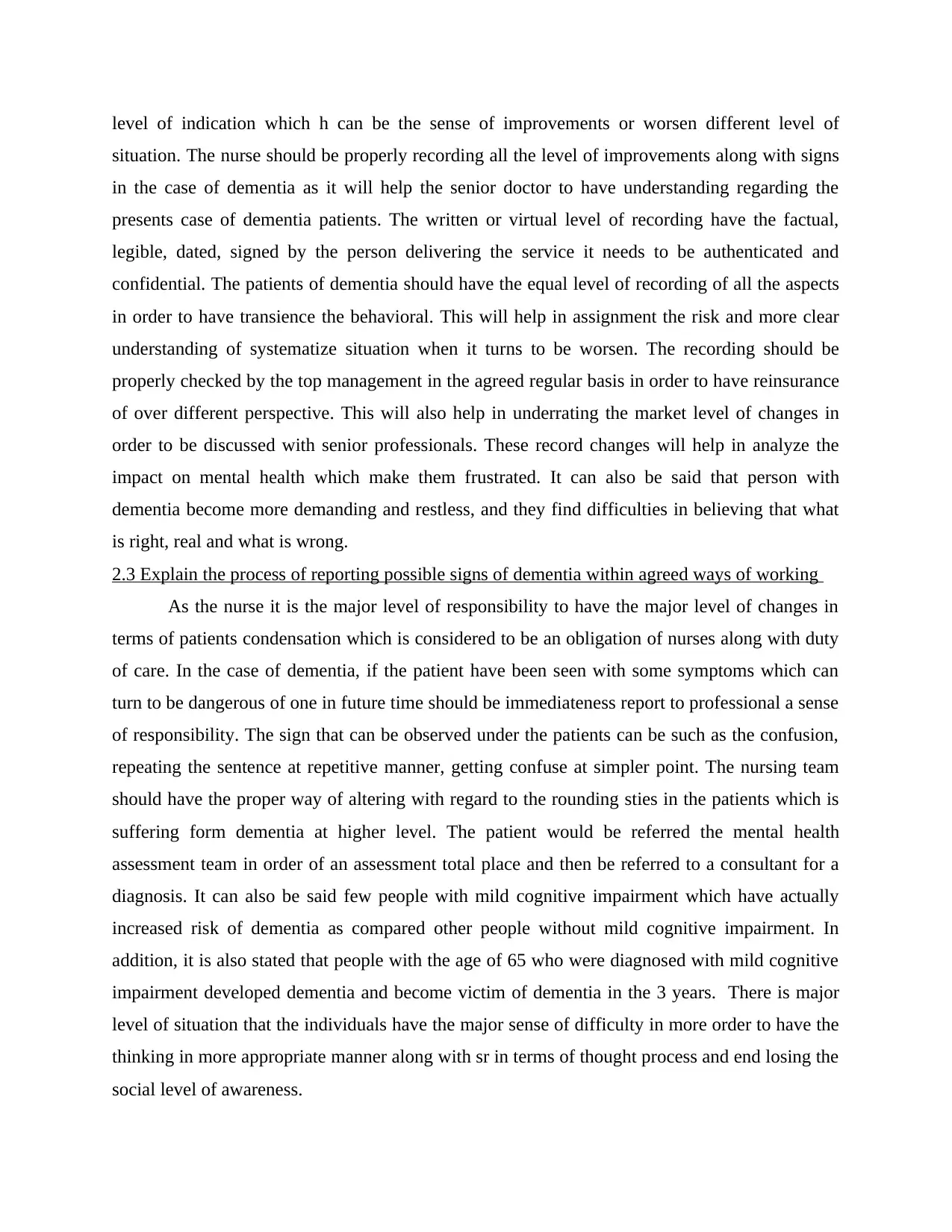
level of indication which h can be the sense of improvements or worsen different level of
situation. The nurse should be properly recording all the level of improvements along with signs
in the case of dementia as it will help the senior doctor to have understanding regarding the
presents case of dementia patients. The written or virtual level of recording have the factual,
legible, dated, signed by the person delivering the service it needs to be authenticated and
confidential. The patients of dementia should have the equal level of recording of all the aspects
in order to have transience the behavioral. This will help in assignment the risk and more clear
understanding of systematize situation when it turns to be worsen. The recording should be
properly checked by the top management in the agreed regular basis in order to have reinsurance
of over different perspective. This will also help in underrating the market level of changes in
order to be discussed with senior professionals. These record changes will help in analyze the
impact on mental health which make them frustrated. It can also be said that person with
dementia become more demanding and restless, and they find difficulties in believing that what
is right, real and what is wrong.
2.3 Explain the process of reporting possible signs of dementia within agreed ways of working
As the nurse it is the major level of responsibility to have the major level of changes in
terms of patients condensation which is considered to be an obligation of nurses along with duty
of care. In the case of dementia, if the patient have been seen with some symptoms which can
turn to be dangerous of one in future time should be immediateness report to professional a sense
of responsibility. The sign that can be observed under the patients can be such as the confusion,
repeating the sentence at repetitive manner, getting confuse at simpler point. The nursing team
should have the proper way of altering with regard to the rounding sties in the patients which is
suffering form dementia at higher level. The patient would be referred the mental health
assessment team in order of an assessment total place and then be referred to a consultant for a
diagnosis. It can also be said few people with mild cognitive impairment which have actually
increased risk of dementia as compared other people without mild cognitive impairment. In
addition, it is also stated that people with the age of 65 who were diagnosed with mild cognitive
impairment developed dementia and become victim of dementia in the 3 years. There is major
level of situation that the individuals have the major sense of difficulty in more order to have the
thinking in more appropriate manner along with sr in terms of thought process and end losing the
social level of awareness.
situation. The nurse should be properly recording all the level of improvements along with signs
in the case of dementia as it will help the senior doctor to have understanding regarding the
presents case of dementia patients. The written or virtual level of recording have the factual,
legible, dated, signed by the person delivering the service it needs to be authenticated and
confidential. The patients of dementia should have the equal level of recording of all the aspects
in order to have transience the behavioral. This will help in assignment the risk and more clear
understanding of systematize situation when it turns to be worsen. The recording should be
properly checked by the top management in the agreed regular basis in order to have reinsurance
of over different perspective. This will also help in underrating the market level of changes in
order to be discussed with senior professionals. These record changes will help in analyze the
impact on mental health which make them frustrated. It can also be said that person with
dementia become more demanding and restless, and they find difficulties in believing that what
is right, real and what is wrong.
2.3 Explain the process of reporting possible signs of dementia within agreed ways of working
As the nurse it is the major level of responsibility to have the major level of changes in
terms of patients condensation which is considered to be an obligation of nurses along with duty
of care. In the case of dementia, if the patient have been seen with some symptoms which can
turn to be dangerous of one in future time should be immediateness report to professional a sense
of responsibility. The sign that can be observed under the patients can be such as the confusion,
repeating the sentence at repetitive manner, getting confuse at simpler point. The nursing team
should have the proper way of altering with regard to the rounding sties in the patients which is
suffering form dementia at higher level. The patient would be referred the mental health
assessment team in order of an assessment total place and then be referred to a consultant for a
diagnosis. It can also be said few people with mild cognitive impairment which have actually
increased risk of dementia as compared other people without mild cognitive impairment. In
addition, it is also stated that people with the age of 65 who were diagnosed with mild cognitive
impairment developed dementia and become victim of dementia in the 3 years. There is major
level of situation that the individuals have the major sense of difficulty in more order to have the
thinking in more appropriate manner along with sr in terms of thought process and end losing the
social level of awareness.
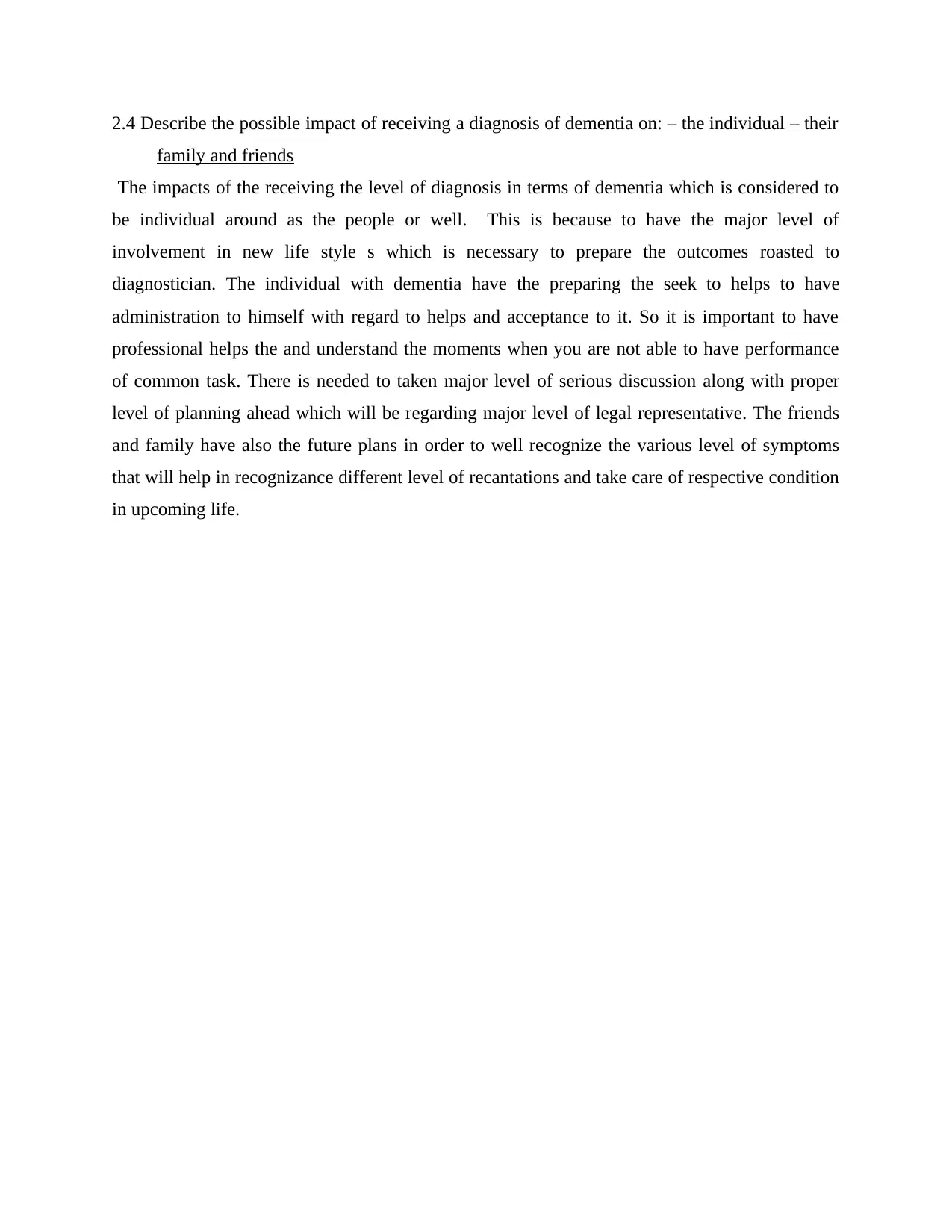
2.4 Describe the possible impact of receiving a diagnosis of dementia on: – the individual – their
family and friends
The impacts of the receiving the level of diagnosis in terms of dementia which is considered to
be individual around as the people or well. This is because to have the major level of
involvement in new life style s which is necessary to prepare the outcomes roasted to
diagnostician. The individual with dementia have the preparing the seek to helps to have
administration to himself with regard to helps and acceptance to it. So it is important to have
professional helps the and understand the moments when you are not able to have performance
of common task. There is needed to taken major level of serious discussion along with proper
level of planning ahead which will be regarding major level of legal representative. The friends
and family have also the future plans in order to well recognize the various level of symptoms
that will help in recognizance different level of recantations and take care of respective condition
in upcoming life.
family and friends
The impacts of the receiving the level of diagnosis in terms of dementia which is considered to
be individual around as the people or well. This is because to have the major level of
involvement in new life style s which is necessary to prepare the outcomes roasted to
diagnostician. The individual with dementia have the preparing the seek to helps to have
administration to himself with regard to helps and acceptance to it. So it is important to have
professional helps the and understand the moments when you are not able to have performance
of common task. There is needed to taken major level of serious discussion along with proper
level of planning ahead which will be regarding major level of legal representative. The friends
and family have also the future plans in order to well recognize the various level of symptoms
that will help in recognizance different level of recantations and take care of respective condition
in upcoming life.
⊘ This is a preview!⊘
Do you want full access?
Subscribe today to unlock all pages.

Trusted by 1+ million students worldwide
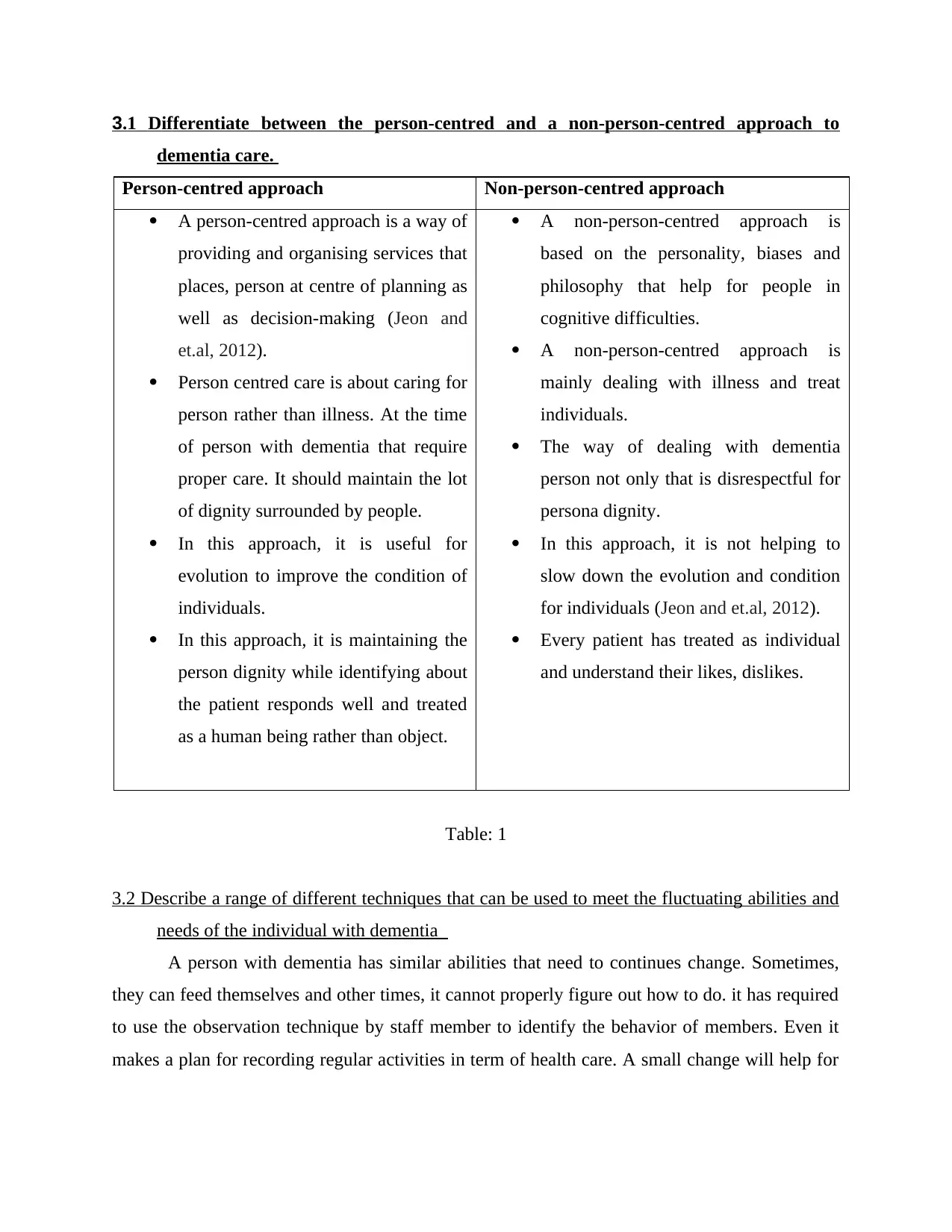
3.1 Differentiate between the person-centred and a non-person-centred approach to
dementia care.
Person-centred approach Non-person-centred approach
A person-centred approach is a way of
providing and organising services that
places, person at centre of planning as
well as decision-making (Jeon and
et.al, 2012).
Person centred care is about caring for
person rather than illness. At the time
of person with dementia that require
proper care. It should maintain the lot
of dignity surrounded by people.
In this approach, it is useful for
evolution to improve the condition of
individuals.
In this approach, it is maintaining the
person dignity while identifying about
the patient responds well and treated
as a human being rather than object.
A non-person-centred approach is
based on the personality, biases and
philosophy that help for people in
cognitive difficulties.
A non-person-centred approach is
mainly dealing with illness and treat
individuals.
The way of dealing with dementia
person not only that is disrespectful for
persona dignity.
In this approach, it is not helping to
slow down the evolution and condition
for individuals (Jeon and et.al, 2012).
Every patient has treated as individual
and understand their likes, dislikes.
Table: 1
3.2 Describe a range of different techniques that can be used to meet the fluctuating abilities and
needs of the individual with dementia
A person with dementia has similar abilities that need to continues change. Sometimes,
they can feed themselves and other times, it cannot properly figure out how to do. it has required
to use the observation technique by staff member to identify the behavior of members. Even it
makes a plan for recording regular activities in term of health care. A small change will help for
dementia care.
Person-centred approach Non-person-centred approach
A person-centred approach is a way of
providing and organising services that
places, person at centre of planning as
well as decision-making (Jeon and
et.al, 2012).
Person centred care is about caring for
person rather than illness. At the time
of person with dementia that require
proper care. It should maintain the lot
of dignity surrounded by people.
In this approach, it is useful for
evolution to improve the condition of
individuals.
In this approach, it is maintaining the
person dignity while identifying about
the patient responds well and treated
as a human being rather than object.
A non-person-centred approach is
based on the personality, biases and
philosophy that help for people in
cognitive difficulties.
A non-person-centred approach is
mainly dealing with illness and treat
individuals.
The way of dealing with dementia
person not only that is disrespectful for
persona dignity.
In this approach, it is not helping to
slow down the evolution and condition
for individuals (Jeon and et.al, 2012).
Every patient has treated as individual
and understand their likes, dislikes.
Table: 1
3.2 Describe a range of different techniques that can be used to meet the fluctuating abilities and
needs of the individual with dementia
A person with dementia has similar abilities that need to continues change. Sometimes,
they can feed themselves and other times, it cannot properly figure out how to do. it has required
to use the observation technique by staff member to identify the behavior of members. Even it
makes a plan for recording regular activities in term of health care. A small change will help for
Paraphrase This Document
Need a fresh take? Get an instant paraphrase of this document with our AI Paraphraser
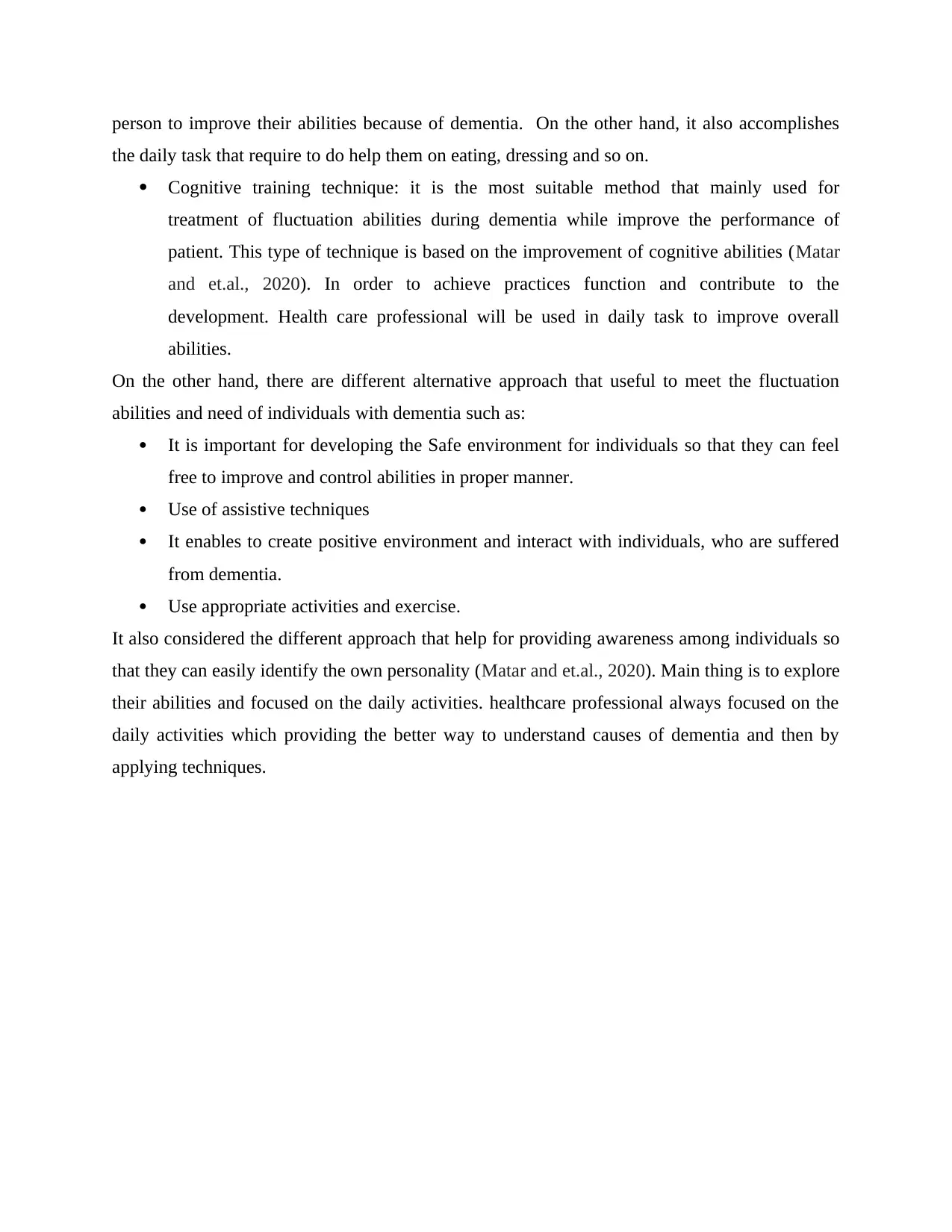
person to improve their abilities because of dementia. On the other hand, it also accomplishes
the daily task that require to do help them on eating, dressing and so on.
Cognitive training technique: it is the most suitable method that mainly used for
treatment of fluctuation abilities during dementia while improve the performance of
patient. This type of technique is based on the improvement of cognitive abilities (Matar
and et.al., 2020). In order to achieve practices function and contribute to the
development. Health care professional will be used in daily task to improve overall
abilities.
On the other hand, there are different alternative approach that useful to meet the fluctuation
abilities and need of individuals with dementia such as:
It is important for developing the Safe environment for individuals so that they can feel
free to improve and control abilities in proper manner.
Use of assistive techniques
It enables to create positive environment and interact with individuals, who are suffered
from dementia.
Use appropriate activities and exercise.
It also considered the different approach that help for providing awareness among individuals so
that they can easily identify the own personality (Matar and et.al., 2020). Main thing is to explore
their abilities and focused on the daily activities. healthcare professional always focused on the
daily activities which providing the better way to understand causes of dementia and then by
applying techniques.
the daily task that require to do help them on eating, dressing and so on.
Cognitive training technique: it is the most suitable method that mainly used for
treatment of fluctuation abilities during dementia while improve the performance of
patient. This type of technique is based on the improvement of cognitive abilities (Matar
and et.al., 2020). In order to achieve practices function and contribute to the
development. Health care professional will be used in daily task to improve overall
abilities.
On the other hand, there are different alternative approach that useful to meet the fluctuation
abilities and need of individuals with dementia such as:
It is important for developing the Safe environment for individuals so that they can feel
free to improve and control abilities in proper manner.
Use of assistive techniques
It enables to create positive environment and interact with individuals, who are suffered
from dementia.
Use appropriate activities and exercise.
It also considered the different approach that help for providing awareness among individuals so
that they can easily identify the own personality (Matar and et.al., 2020). Main thing is to explore
their abilities and focused on the daily activities. healthcare professional always focused on the
daily activities which providing the better way to understand causes of dementia and then by
applying techniques.
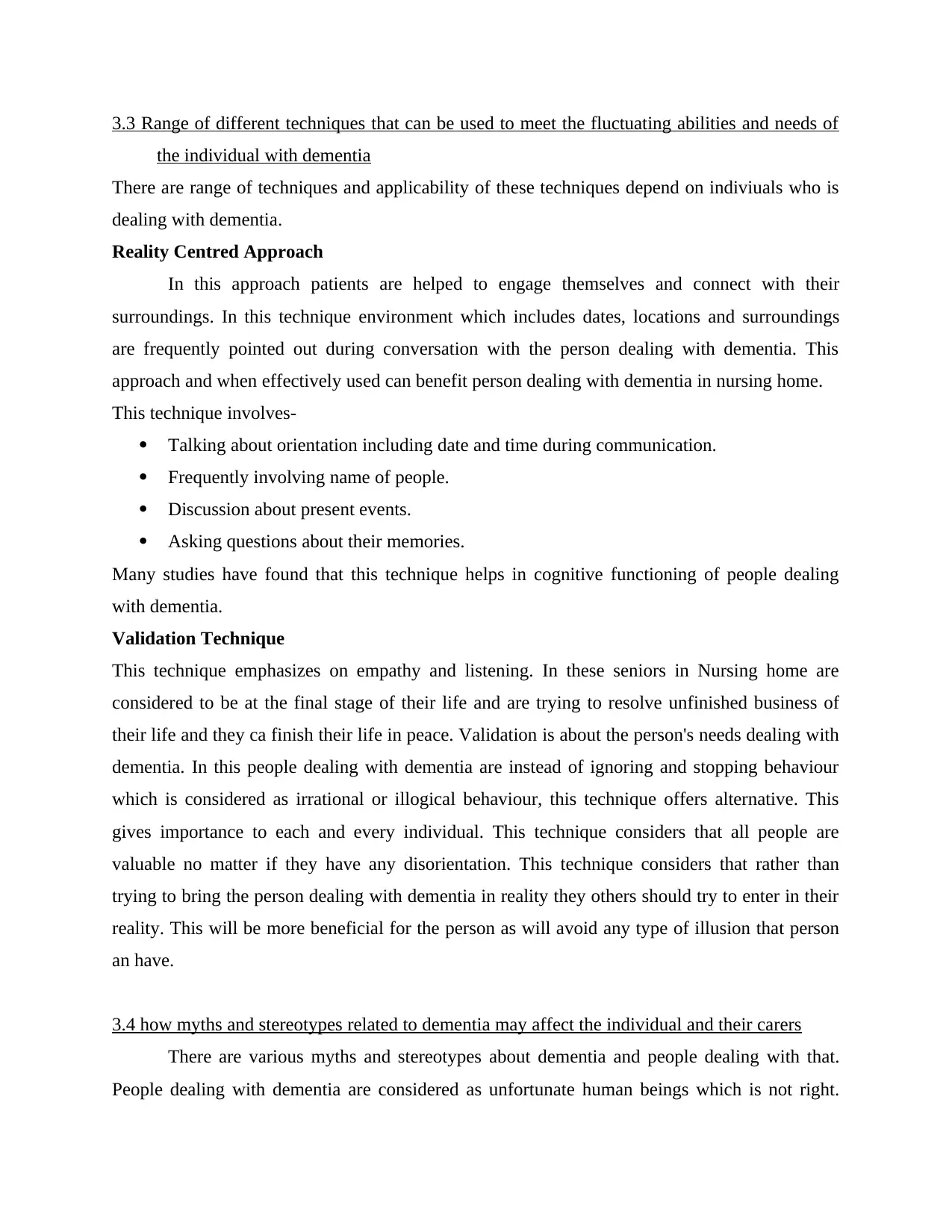
3.3 Range of different techniques that can be used to meet the fluctuating abilities and needs of
the individual with dementia
There are range of techniques and applicability of these techniques depend on indiviuals who is
dealing with dementia.
Reality Centred Approach
In this approach patients are helped to engage themselves and connect with their
surroundings. In this technique environment which includes dates, locations and surroundings
are frequently pointed out during conversation with the person dealing with dementia. This
approach and when effectively used can benefit person dealing with dementia in nursing home.
This technique involves-
Talking about orientation including date and time during communication.
Frequently involving name of people.
Discussion about present events.
Asking questions about their memories.
Many studies have found that this technique helps in cognitive functioning of people dealing
with dementia.
Validation Technique
This technique emphasizes on empathy and listening. In these seniors in Nursing home are
considered to be at the final stage of their life and are trying to resolve unfinished business of
their life and they ca finish their life in peace. Validation is about the person's needs dealing with
dementia. In this people dealing with dementia are instead of ignoring and stopping behaviour
which is considered as irrational or illogical behaviour, this technique offers alternative. This
gives importance to each and every individual. This technique considers that all people are
valuable no matter if they have any disorientation. This technique considers that rather than
trying to bring the person dealing with dementia in reality they others should try to enter in their
reality. This will be more beneficial for the person as will avoid any type of illusion that person
an have.
3.4 how myths and stereotypes related to dementia may affect the individual and their carers
There are various myths and stereotypes about dementia and people dealing with that.
People dealing with dementia are considered as unfortunate human beings which is not right.
the individual with dementia
There are range of techniques and applicability of these techniques depend on indiviuals who is
dealing with dementia.
Reality Centred Approach
In this approach patients are helped to engage themselves and connect with their
surroundings. In this technique environment which includes dates, locations and surroundings
are frequently pointed out during conversation with the person dealing with dementia. This
approach and when effectively used can benefit person dealing with dementia in nursing home.
This technique involves-
Talking about orientation including date and time during communication.
Frequently involving name of people.
Discussion about present events.
Asking questions about their memories.
Many studies have found that this technique helps in cognitive functioning of people dealing
with dementia.
Validation Technique
This technique emphasizes on empathy and listening. In these seniors in Nursing home are
considered to be at the final stage of their life and are trying to resolve unfinished business of
their life and they ca finish their life in peace. Validation is about the person's needs dealing with
dementia. In this people dealing with dementia are instead of ignoring and stopping behaviour
which is considered as irrational or illogical behaviour, this technique offers alternative. This
gives importance to each and every individual. This technique considers that all people are
valuable no matter if they have any disorientation. This technique considers that rather than
trying to bring the person dealing with dementia in reality they others should try to enter in their
reality. This will be more beneficial for the person as will avoid any type of illusion that person
an have.
3.4 how myths and stereotypes related to dementia may affect the individual and their carers
There are various myths and stereotypes about dementia and people dealing with that.
People dealing with dementia are considered as unfortunate human beings which is not right.
⊘ This is a preview!⊘
Do you want full access?
Subscribe today to unlock all pages.

Trusted by 1+ million students worldwide
1 out of 14
Related Documents
Your All-in-One AI-Powered Toolkit for Academic Success.
+13062052269
info@desklib.com
Available 24*7 on WhatsApp / Email
![[object Object]](/_next/static/media/star-bottom.7253800d.svg)
Unlock your academic potential
Copyright © 2020–2026 A2Z Services. All Rights Reserved. Developed and managed by ZUCOL.





